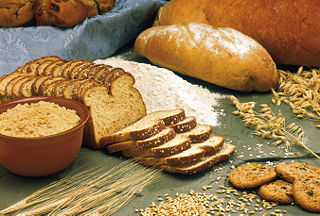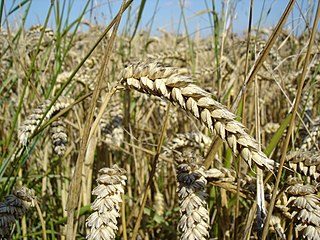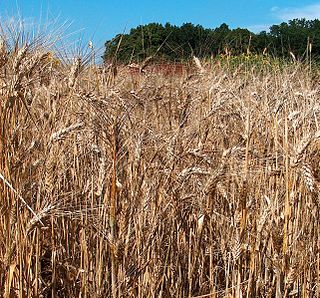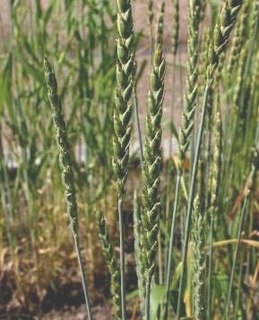
A cereal is any grass cultivated (grown) for the edible components of its grain, composed of the endosperm, germ, and bran. The term may also refer to the resulting grain itself. Cereal grain crops are grown in greater quantities and provide more food energy worldwide than any other type of crop and are therefore staple crops. Edible grains from other plant families, such as buckwheat (Polygonaceae), quinoa (Amaranthaceae) and chia (Lamiaceae), are referred to as pseudocereals.

Gluten is a group of proteins, called prolamins and glutelins, which occur with starch in the endosperm of various cereal grains. This protein complex supplies 75–85% of the total protein in bread wheat. It is found in related wheat species and hybrids,, barley, rye, and oats, as well as products derived from these grains, such as breads and malts.

Wheat is a grass widely cultivated for its seed, a cereal grain which is a worldwide staple food. The many species of wheat together make up the genus Triticum; the most widely grown is common wheat.

In economics, a commodity is an economic good or service that has full or substantial fungibility: that is, the market treats instances of the good as equivalent or nearly so with no regard to who produced them.

Flour is a powder made by grinding raw grains, roots, beans, nuts, or seeds. It is used to make many different foods. Cereal flour is the main ingredient of bread, which is a staple food for most cultures. Wheat flour is one of the most important ingredients in Oceanic, European, South American, North American, Middle Eastern, North Indian and North African cultures, and is the defining ingredient in their styles of breads and pastries.
In finance, a put or put option is a stock market instrument which gives the holder the right to sell an asset, at a specified price, by a specified date to a given party. The purchase of a put option is interpreted as a negative sentiment about the future value of the underlying stock. The term "put" comes from the fact that the owner has the right to "put up for sale" the stock or index.

Wheat gluten is a food made from gluten, the main protein of wheat. It is made by washing wheat flour dough with water until all the starch granules have been removed, leaving the sticky insoluble gluten as an elastic mass, which is then cooked before being eaten.

A hedge is an investment position intended to offset potential losses or gains that may be incurred by a companion investment. A hedge can be constructed from many types of financial instruments, including stocks, exchange-traded funds, insurance, forward contracts, swaps, options, gambles, many types of over-the-counter and derivative products, and futures contracts.

Durum wheat, also called pasta wheat or macaroni wheat, is a tetraploid species of wheat. It is the second most cultivated species of wheat after common wheat, although it represents only 5% to 8% of global wheat production. It was developed by artificial selection of the domesticated emmer wheat strains formerly grown in Central Europe and the Near East around 7000 BC, which developed a naked, free-threshing form. Like emmer, durum wheat is awned. It is the predominant wheat that grows in the Middle East.

The Canadian Wheat Board was a marketing board for wheat and barley in Western Canada. Established by the Parliament of Canada on 5 July 1935, its operation was governed by the Canadian Wheat Board Act as a mandatory producer marketing system for wheat and barley in Alberta, Saskatchewan, Manitoba, and a small part of British Columbia. It was illegal for any farmer in areas under the CWB's jurisdiction to sell their wheat and barley through any other channel than the CWB. Although often called a monopoly, it was actually a monopsony since it was the only buyer of wheat and barley. It was a marketing agency acting on behalf of Western Canadian farmers, passing all profits from its operation back to farmers. Its market power over wheat and barley marketing was referred to as the "Single Desk".
" The CWB’s mandate was to pay farmers a base price for their grain, identify markets, negotiate the best price, deliver the goods, issue advance cheques and make final payment after the crop was sold. If the wheat market went up, farmers pocketed the profits. If the market went down, the government absorbed the loss. Nothing was subtracted from the farmer’s share except the cost of marketing and delivery."
Wheat flour is a powder made from the grinding of wheat used for human consumption. Wheat varieties are called "soft" or "weak" if gluten content is low, and are called "hard" or "strong" if they have high gluten content. Hard flour, or bread flour, is high in gluten, with 12% to 14% gluten content, and its dough has elastic toughness that holds its shape well once baked. Soft flour is comparatively low in gluten and thus results in a loaf with a finer, crumbly texture. Soft flour is usually divided into cake flour, which is the lowest in gluten, and pastry flour, which has slightly more gluten than cake flour.

Spelt, also known as dinkel wheat or hulled wheat, is a species of wheat cultivated since approximately 5000 BCE.
Crop insurance is purchased by agricultural producers, and subsidized by the federal government, to protect against either the loss of their crops due to natural disasters, such as hail, drought, and floods, or the loss of revenue due to declines in the prices of agricultural commodities. The two general categories of crop insurance are called crop-yield insurance and crop-revenue insurance. On average, the federal government subsidizes 62 percent of the premium. In 2014, crop insurance policies covered 294 million acres. Major crops are insurable in most counties where they are grown, and approximately 83% of U.S. crop acreage is insured under the federal crop insurance program. Four crops—corn, cotton, soybeans, and wheat— typically account for more than 70% of total enrolled acres. For these major crops, a large share of plantings is covered by crop insurance. In 2014, the portion of total corn acreage covered by federal crop insurance was 87%; cotton, 96%; soybeans, 88%; and wheat, 84%.
The Chorleywood bread process (CBP) is a process of making dough in bread production. The process was developed in 1961 by the British Baking Industries Research Association based at Chorleywood in Hertfordshire, and by 2009 was used to make 80% of the United Kingdom's bread. Compared to the older bulk fermentation process, the CBP is able to use lower-protein wheat, and produces bread in a shorter time.

Wheat allergy is an allergy to wheat which typically presents itself as a food allergy, but can also be a contact allergy resulting from occupational exposure. Like all allergies, wheat allergy involves immunoglobulin E and mast cell response. Typically the allergy is limited to the seed storage proteins of wheat. Some reactions are restricted to wheat proteins, while others can react across many varieties of seeds and other plant tissues. Wheat allergy is rare. Prevalence in adults was found to be 0.21% in a 2012 study in Japan.

In finance, an option is a contract which gives the buyer the right, but not the obligation, to buy or sell an underlying asset or instrument at a specified strike price prior to or on a specified date, depending on the form of the option. The strike price may be set by reference to the spot price of the underlying security or commodity on the day an option is taken out, or it may be fixed at a discount or at a premium. The seller has the corresponding obligation to fulfill the transaction – to sell or buy – if the buyer (owner) "exercises" the option. An option that conveys to the owner the right to buy at a specific price is referred to as a call; an option that conveys the right of the owner to sell at a specific price is referred to as a put. Both are commonly traded, but the call option is more frequently discussed.
Wheat middlings are the product of the wheat milling process that is not flour. A good source of protein, fiber, phosphorus, and other nutrients, they are used to produce foods like pasta, breakfast cereals, puddings, and couscous for humans, as well as fodder for livestock and pets. They are also being researched for use as a biofuel.
A control premium is an amount that a buyer is sometimes willing to pay over the current market price of a publicly traded company in order to acquire a controlling share in that company.

Agriculture in India is highly susceptible to risks like droughts and floods. It is necessary to protect the farmers from natural calamities and ensure their credit eligibility for the next season. For this purpose, the Government of India introduced many agricultural schemes throughout the country.

Post Holdings is an American consumer packaged goods holding company headquartered in the suburban St. Louis community of Brentwood, Missouri. It operates in the center-of-the-store, foodservice, food ingredient, refrigerated, active nutrition and private label categories. Its Post Consumer Brands business manufactures, markets and sells both branded and private label cereal products. Its Michael Foods Group business supplies value-added egg products and refrigerated potato products to the foodservice and food ingredient channels. Through its Post Refrigerated Retail business, Post offers potato, egg, sausage and cheese refrigerated side dishes products. Its active nutrition business markets and distributes protein beverages, bars and gels. Post participates in the private brand food category through its investment with Thomas H. Lee Partners in 8th Avenue Food & Provisions, a leading, private brand centric, consumer products holding company.












